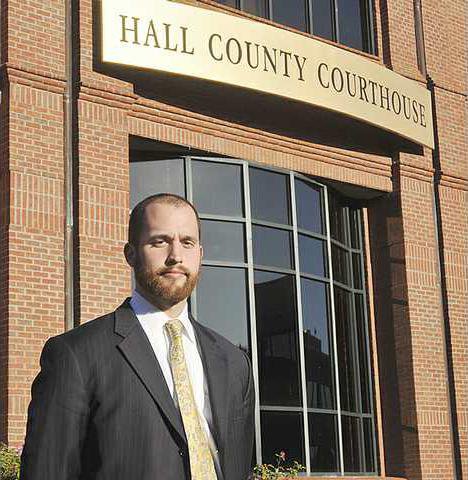Not often does a defense attorney less than a year removed from law school get part of a controversial law thrown out by the Georgia Supreme Court.
But that’s what happened after 26-year-old Hall County public defender Adam Levin, with help from colleague Brett Willis, argued the case of a homeless sex offender in front of the state’s highest court.
The case of William James Santos prompted the state Supreme Court last week to declare Georgia’s sex offender registration law as it applies to the homeless "constitutionally vague" and forced lawmakers to revisit how people without permanent addresses can comply with the law.
For Levin, who admits he still is adjusting to his role as public speaker, the prospect of arguing in front of the seven justices in Atlanta was nerve-inducing, but a chance he nevertheless could not resist.
"I just wanted the experience of getting up there," Levin said.
Despite Levin having tried only a handful of cases, Northeastern Circuit Public Defender’s Office Director Brad Morris gave him the job of arguing the Santos case over more seasoned lawyers in the public defender’s office, whose 13 staff attorneys represent poor criminal defendants in Hall and Dawson counties.
"I pestered Brad about letting me take a shot at it, and he was willing to take the risk and let me get my feet wet," Levin said.
Less than a year earlier, Morris was helping Levin adjust his tie for his swearing-in to the bar.
Levin came to the public defender’s office in May 2007 and passed the bar the following October after his graduation from Georgia State University School of Law. He earned an undergraduate degree in music engineering from the University of Miami in 2004, but decided "I was not a very good musician."
"I just didn’t have the ear for it, so as soon as I could I applied to law school," he said.
Levin has legal roots. His father, Jay Levin, is a partner with Powell Goldstein, a large corporate law firm in Atlanta.
But Levin chose the often thankless work of the public defender over the better-paying jobs some of his law school classmates took at places such as prestigious Atlanta firm King and Spalding.
Levin said he discovered the appeal of criminal defense work while in law school.
"The work was interesting, the people were interesting, and I think there’s just something inherently interesting about the underdog, which is who we mostly work with," Levin said. "I’ve always had something for the underdog."
Levin was assigned the Santos case through an alphabetical system and soon found what he said were "some interesting issues." Mainly, how does a sex offender without a home comply with a law that says they must register their place of residence?
The state Supreme Court last April agreed to hear the pretrial appeal and Levin and Willis prepared their legal brief. Levin credits his more-experienced colleague Willis with much of the work compiling the brief and lining up help from old law school classmates and professors to prepare for oral arguments.
"I was sort of spitting out the ideas, and Brett crafted it," Levin said.
Morris said Levin’s modesty aside, the young attorney deserves the most credit.
"I think our office has been fortunate in getting people who are focused in what they’re doing, and who understand that only when you have strong, hard-working advocates is the Constitution protected," Morris said. "Adam, along with a lot of other people here, could have much more lucrative positions elsewhere, but they believe in what they’re doing, and this case is a good example of the work he and other people in this office are doing."
Levin eschews any notion that the big legal win so early in his career is a feather in his cap. While he knows the case was watched closely by other attorneys, he believes the court’s decision in Santos v. State is just one small part of the overriding legal controversy that surrounds Georgia’s sex offender registration requirements.
"It was just a question that everyone wanted an answer to, and our office just happened to have the case that asked the question," Levin said.
Of the outcome, Levin said, "It was satisfying, there was a sense of accomplishment. But I just felt like that was the correct result. That was what should happen."

